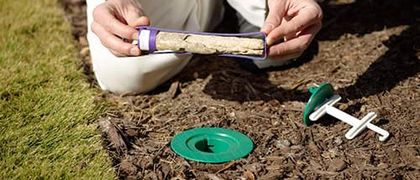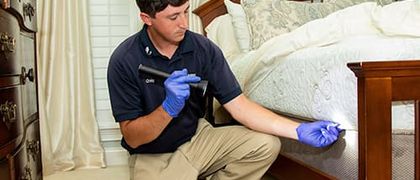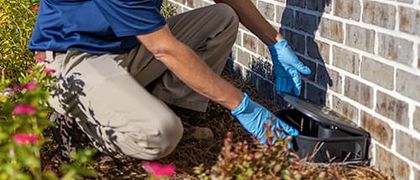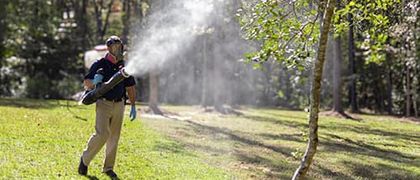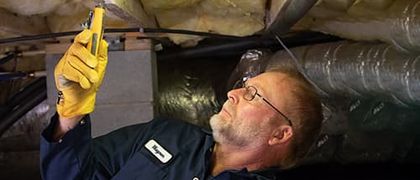Are Wasps Getting More Aggressive? Here’s Why You’re Seeing More of Them
If you’re noticing more wasps buzzing around your porch, patio, or drinks this July in the Pee Dee and Grand Strand areas, you’re not alone and definitely not imagining things. Homeowners in Florence, Myrtle Beach, and across our region have started dealing with a noticeable increase in wasp activity.
While wasps technically became active in early spring, their presence is now becoming impossible to ignore—and it will only intensify as summer approaches its peak. So what’s really behind this uptick?

In this blog post, we’ll explore:
- Common wasp species in the Pee Dee & Grand Strand areas
- Timing
- Behavior
- What you can do to protect your home and family now, before late summer turns things from annoying to aggressive
- How the local pros at Harris Pest Control can help
Know Your Wasps: What’s Buzzing in Pee Dee and Grand Strand?
In South Carolina, the most common wasps you’ll encounter include:
- Build umbrella-shaped nests under eaves, porch ceilings, and shutters.
- Generally less aggressive if left undisturbed.
- Hover slowly around home exteriors.
- More aggressive and quick-moving than other wasps.
- Often nest underground, in wall voids, or cavities.
- Known for multiple stings and pursuing threats.
Bald-Faced Hornets
- Large, aerial “yellow jackets” that build football-sized nests on trees or buildings.
- Very aggressive nest defenders.
- Capable of swarming if disturbed.
Correctly identifying which species you’re dealing with is key, as control methods can differ.
Wasps in Spring vs. Summer: A Seasonal Build-up
Understanding the life cycle of a wasp colony explains why wasps behave differently as the months go by.
Spring: The Founding Stage
After winter, surviving queen wasps emerge and search for safe sites to start new nests, often under eaves, in sheds, behind shutters, or in corners of garages or attics. In spring:
- Queens build small paper-like nests, especially paper wasps.
- They lay eggs and hunt for insects to feed their growing larvae.
- Colonies are small, so spotting wasps is less common.
If a queen chose your property this spring, and the nest was undisturbed, a whole worker colony is now likely established by mid-July.
Mid-Summer: More Wasps, More Risks
By the time July rolls around, wasp nests are well established and the colonies are busy growing. You’ll notice worker wasps actively flying around homes, garden sheds, trash bins, and outdoor eating areas. They’re much more active now than they were earlier in the year.
Here’s what’s going on right now:
- Depending on the species, nests can house hundreds of wasps, sometimes even thousands.
- The wasps are still hunting protein-rich insects to feed their young larvae.
- At the same time, they’re becoming increasingly protective of their nests—meaning they’re more likely to sting if disturbed.
This period is a key turning point for wasp activity, and you can expect their presence and defensive behavior to really ramp up as we move into August and September. Understanding this helps you take smarter precautions now—before the wasp season reaches its peak.
Why Late Summer Is Prime Time for Wasp Aggression
As summer fades into fall, you might notice wasps acting bolder and hanging around more than usual. There’s a good reason for that.
Their Menu Changes
Earlier in the season, wasps are busy hunting insects to feed their larvae. But once those larvae grow up, the wasps’ diet shifts—they start craving sugar for energy. That’s why you’ll often see them going after things like:
- Open soda or juice cans
- Ripe or fermenting fruit
- Sugary spills on tables during outdoor meals
This change puts wasps directly in conflict with humans, especially at picnics and barbecues.
They’re Defending the Queen and Future Colonies
Late summer is when colonies produce new virgin queens and males for reproduction. The next generation's survival relies on successful mating, so wasps become hyper-defensive of their nests, ready to sting at perceived threats.
Nest Populations Are at Their Peak
With thousands of wasps in a single nest, depending on the species, interactions with humans multiply. Larger populations mean more wasps to defend territory, stalk food, or accidentally get provoked.
Why Are There So Many Wasps Near My Home?
Noticing more paper wasps hanging around your roofline or yellow jackets darting out of the ground as you mow? You’re not imagining it—the warm, humid weather here in the Grand Strand and Pee Dee is ideal for wasps to build large colonies and become more active.
Here’s what wasps are busy doing around your property this summer:
- Building nests in sheltered spots like under eaves, inside sheds, and sometimes even on playground equipment or patio furniture.
- Scavenging for food near trash cans, outdoor meals, ripe or fermenting fruit, and sugary drinks—especially as their dietary needs shift in late summer.
- Increasing activity during the hottest parts of the day, when foraging for food is most critical for the growing colony.
As nests expand over the season, wasps become more territorial, and their chances of stinging increase, especially if their nests or food sources are disturbed. This peak in activity typically continues into late summer and early fall, so it’s important to be aware and take steps to protect your family and property.
How to Protect Yourself and Your Family
- Stay calm: If a wasp approaches, avoid fast movements—swatting can make them more aggressive.
- Cover food and drinks: Wasps will find uncovered sweets and proteins, so be sure to keep food and drinks covered, especially in outdoor settings.
- Look for wasp nests regularly: Spotting the first signs of a nest early, especially under rooflines or in bushes, can prevent a full-blown infestation.
- Avoid DIY nest removal: Disturbing an established nest can make things worse, sometimes leading wasps to move inside walls or attics where they’re even harder to control. Professional removal is the safest choice, especially for large or hidden nests.
Local Expertise Makes the Difference
Harris Pest Control has seen firsthand how wasp behavior in the Pee Dee and Grand Strand aligns with national trends, with the greatest risk of aggression and stings from late summer through early fall. The team at our locally owned and family-operated pest control company knows how to identify the type of wasp and locate hard-to-find nests. We use the most effective removal and prevention methods for homes and families just like yours.
Got wasps buzzing around your backyard oasis? Don’t wait until someone gets stung. Contact Harris Pest Control for expert, local help—so you and your family can enjoy the outdoors, wasp-free, all season long.
Additional Services
Get Started Today!



